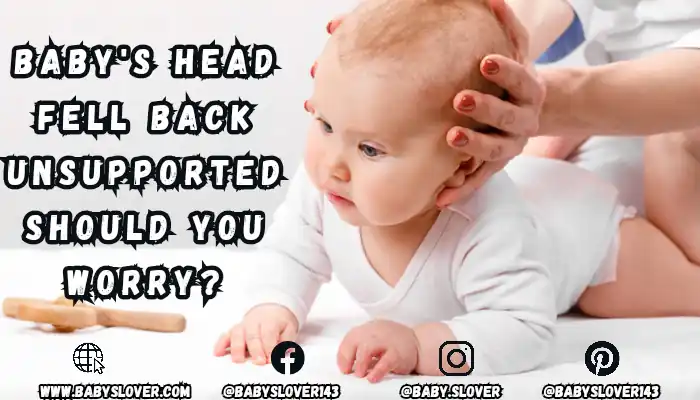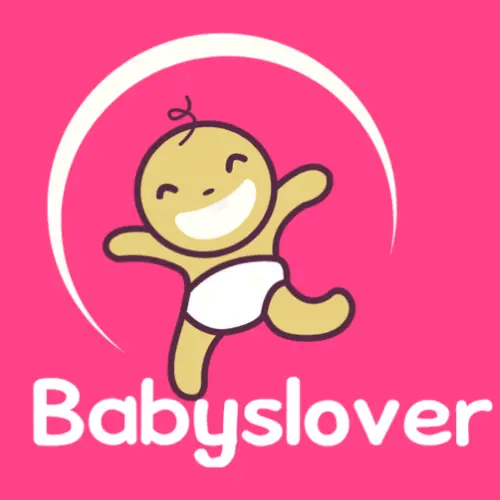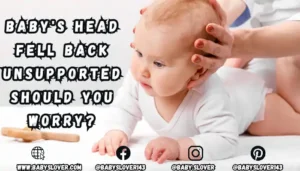I know how scary it can be when your baby’s head falls backwards Unsupported. One minute you’re cradling your little one, and the next their head is flopping back! It’s enough to increase any parent’s heart skip a beat. But try not to panic. I learned that a baby’s head falling backwards is actually totally normal in the early months. Their little neck muscles just aren’t strong enough yet to hold up those big heavy heads of theirs.
In this post, I’ll explain exactly why does your baby’s head fell back unsupported, when you don’t need to worry, and how to prevent their head from flopping backwards. By the end, you’ll breathe a sigh of relief knowing that your baby’s head falling backwards is most likely completely normal and not dangerous at all.

Contents
- 1 Why Does My Baby’s Head Fell Back Unsupported?
- 2 Is it Normal for a Baby’s Head to Fall Backwards?
- 3 Is it Dangerous for a Baby’s Head to Fall Back Unsupported?
- 4 Ways to Prevent the Baby’s Head Falling Back Unsupported?
- 5 Signs of a Head or Neck Injury After a Baby’s Head Falling Backwards
- 6 When to Take Your Baby to a Pediatrician for Head And Neck Injuries?
- 7 Related FAQs to Baby’s Head Falling Backwards
- 7.1 Why does my baby’s head fall back?
- 7.2 What Happens if Baby’s Head Flops Back?
- 7.3 When should I worry about baby not lifting head?
- 7.4 What causes a baby’s head to fall back unsupported?
- 7.5 Should I worry if my baby’s head fell backwards?
- 7.6 What are the signs of injury I should look for after a fall?
- 7.7 How can I prevent my baby’s head from falling backward?
- 7.8 What’s the best way to hold a baby to support their head?
- 7.9 Is it safe for a baby to sleep with their head tilted back?
- 7.10 When should I take my baby to the ER after a head fall?
- 8 Conclusion on Baby’s Head Falling Back Unsupported
Why Does My Baby’s Head Fell Back Unsupported?
In the early months, babies have poor head and neck control since their muscles are still very weak. A newborn’s neck muscles are not yet strong enough to support their disproportionately large and heavy heads against gravity.
This is why when you pick up or hold your young baby, their head will often tip backwards or flop to the side without support. Their neck simply does not have the ability yet to keep their head upright. This is completely normal and expected before a baby has developed the muscle tone and strength to hold their head steady, which typically occurs around 3-6 months as their neck controls improves.
Until your baby has built up their neck muscles, their head will need assistance staying properly aligned when sitting, lying down, or being moved. Don’t be alarmed if your baby’s head lags or falls back when unsupported – just provide gentle head and neck support whenever holding or moving them.
Is it Normal for a Baby’s Head to Fall Backwards?
Yes, it is completely normal and expected for a young baby’s head to tip backwards or flop sideways when not properly supported. Since their neck muscles are still developing and lack the strength to hold up their head, gravity will cause it to fall back or to the side if left unsupported.
You may notice your newborn’s head lagging backwards when you pick them up, lay them down, or transition them between positions. Their head may also tip back unsupported in baby gear like swings, bouncers, strollers, or infant car seats if the incline is too far back. Even while holding your baby, their head may fall backwards if you shift them or turn your body and their head is not stabilized.
These uncontrolled head movements in babies under 3-6 months are not at all cause for concern, as long as you provide appropriate support for their head and neck whenever handling or moving them. Just remember that their neck development is still a work in progress, so give them an assisting hand to keep their head aligned until their muscles strengthen.
Is it Dangerous for a Baby’s Head to Fall Back Unsupported?
While it is generally normal for your baby’s head to tip back briefly if unsupported, repeatedly allowing their head to fall back or hang unsupported can potentially lead to injury. Without proper neck muscle strength, the uncontrolled movement creates strain on the delicate bones, muscles, and ligaments of their neck and upper spine.
Letting your baby’s head routinely lag unsupported as their neck hyperextends can also compress the arteries and irritate the spinal cord. In severe cases, repetitive forceful hyperextension can cause damage to the cervical spine. While brief episodes of head tipping back are harmless when handled properly, regularly allowing your infant’s heavy head to droop back unsupported places unhealthy stress on their neck.
This is why it is essential to always provide plenty of head and neck support when holding your baby or placing them down in the early months, limiting unsupported head movement to protect their developing spine. Gentle guidance and support will prevent hyperextension that could lead to harm.
Ways to Prevent the Baby’s Head Falling Back Unsupported?
Here are some tips on preventing a baby’s head from falling back unsupported:
- When holding your baby, be sure to support their head and neck with one hand. Their head should not be allowed to dangle downwards. Keep their head upright and aligned with their back.
- Use rolled up blankets or towels to prop up your baby’s head and neck when placing them down in carriers, strollers, swings, or car seats. Adjust inclines as needed to prevent the head from tipping back.
- Avoid leaving your baby to lie down unattended, as their heavy head could cause them to tip backwards without support. Use pillows or rolled up towels on each side of the head when laying down.
- During tummy time, place toys or objects for your baby to look at to motivate them to lift their head up. Limit time spent with their head turned to one side.
- When feeding, holding, or playing with your baby, keep them in an upright seated position supported by your hands or a pillow. Avoid letting their head dangle backwards unsupported for long periods.
- Choose baby wraps and carriers that properly support the head and don’t allow it to fall back. Structured carriers are better than stretchy wraps.
- When carrying your baby, bring them close to your chest so their head can rest on you if needed, rather than dangling.
- Check that car seats are installed at an appropriate recline angle and the head does not tip back. Adjust accordingly.
- Remind anyone holding your baby about the importance of providing head and neck support at all times.
Read Also Baby’s Shoulder Popping When Picked Up? A Complete Guide for worried Parents
Signs of a Head or Neck Injury After a Baby’s Head Falling Backwards
Here are some signs of a potential head or neck injury after a baby’s head falls backwards:
- Swelling or bruising around the head, neck, or upper back/spine area – this could indicate damage to muscles, bones, or ligaments
- Unusual head positioning such as tilting to one side or the chin pointing upwards more than normal – may be a sign of injury
- Limited range of motion when trying to move the head or neck – could indicate muscle strain or more serious damage
- Excessive crying when moving the head or neck – pain when moving may be a red flag
- Lethargy, weakness, or loss of muscle tone – possible indicator of neurological injury
- Difficulty swallowing or breathing – could signal injury to the spine or neck compression
- Blood or fluid draining from ears – may indicate skull fracture or brain bleed
- Seizure activity – a sign of neurological trauma that requires emergency care
- Loss of consciousness – warrants immediate medical attention to check for brain injury
- Persistent vomiting – needs to be evaluated in case of head trauma or brain bleed
Any signs of distress, unusual symptoms, or changes in behavior after a major head fall should be checked by a doctor immediately to assess for potential injury requiring care.
When to Take Your Baby to a Pediatrician for Head And Neck Injuries?
Here are some guidelines on when to take your baby to the pediatrician to get checked for potential head and neck injuries:
- Immediately if your baby’s head endured any type of significant impact, such as falling off furniture or down stairs. Even if they seem fine, it’s important to get examined.
- Right away if your baby’s neck was forcefully whipped or snapped back suddenly. This can happen if they fall while in a baby carrier or their head falls back quickly.
- As soon as possible if your baby lost consciousness, even if brief, after their head impacted something. Brief loss of consciousness warrants urgent medical evaluation.
- Promptly seek care if your baby has persistent vomiting, seems dazed or confused, or has a dramatic change in behavior after any head injury.
- If your baby shows any signs of distress like trouble breathing, uncontrolled head movements, lethargy or weakness in the arms/legs after their head fell backwards.
- If swelling, bruising, or misshapen head/neck persists more than 24 hours after a head fall backwards, have your pediatrician assess.
- Whenever you notice your baby struggling to move their head and neck normally, such as difficulty lifting their head up.
- If your baby is older than 3-6 months and still lacks head control or seems to regress in their neck strength, consult their doctor.
Don’t hesitate to have your pediatrician examine your baby after any type of head/neck trauma, or if anything concerns you about their condition following an incident. Early evaluation and treatment is key for safety.
Read Also Blowing in Baby’s Face – Is It Safe or Not? What Expert Say About Blowing
Related FAQs to Baby’s Head Falling Backwards
Why does my baby’s head fall back?
A baby’s head falls back due to weak neck muscles unable to support the disproportionately large and heavy head against gravity. This improves over months as the neck strengthens.
What Happens if Baby’s Head Flops Back?
Unless it resulted from major force, a baby should be fine after their head flops back, especially if they show no signs of distress. But monitor them closely and contact a doctor if you notice anything unusual.
When should I worry about baby not lifting head?
Bring up persistent head lagging with your pediatrician by 6 months old. But remember every baby develops on their own timeline, so no need to panic about minor delays.
What causes a baby’s head to fall back unsupported?
Lack of neck muscle strength allows a baby’s head to fall back when unsupported. This is totally normal and expected in newborns and young infants as they build neck control.
Should I worry if my baby’s head fell backwards?
In most cases, there is no need to worry if your baby’s head tips back briefly as long as you provide proper support after. But call your doctor if baby hit their head forcefully or shows signs of distress.
What are the signs of injury I should look for after a fall?
Look for unusual swelling/bruising, difficulty moving the head/neck, lethargy, loss of muscle tone, swallowing issues, seizure activity or other abnormal symptoms suggesting injury.
How can I prevent my baby’s head from falling backward?
Always support your baby’s head and neck when holding them. Use pillows and head positioning aids when placing them down. Limit time spent with head dangling back unsupported.
What’s the best way to hold a baby to support their head?
Use one hand to grasp the back of baby’s head and neck for support. Bring them close to your chest so their head can rest on you if needed.
Is it safe for a baby to sleep with their head tilted back?
No, babies should sleep on their backs with heads in a neutral position. Use a flat, firm mattress without pillows or padding that may cause the head to tilt.
When should I take my baby to the ER after a head fall?
Seek emergency care if baby hit their head forcefully, lost consciousness, has seizure activity, persistent vomiting, or other worrying symptoms that may indicate a serious injury.
Read Also Baby’s Poop Smells Like Fish: A Parent’s Guide to Causes and Treatment
Conclusion on Baby’s Head Falling Back Unsupported
Seeing your baby’s little head flop backwards can certainly give you a fright as a parent! But try not to stress – a baby’s head fell back unsupported is usually totally harmless, especially once you get the hang of providing plenty of support. Their little neck muscles just need some time to strengthen up.
Before you know it, your baby will have full control of their head and neck. In the meantime, remember to keep one hand back there for support whenever you pick up, carry or lay your little one down. With the proper support from you, there’s no need to worry about their head tipping back unsupported.
It may look alarming at first, but rest assured that brief episodes of your baby’s head falling backwards are a normal part of their development. Just remain attentive and lend them a helping hand. Very soon, you’ll see them holding their head up proudly all on their own!

